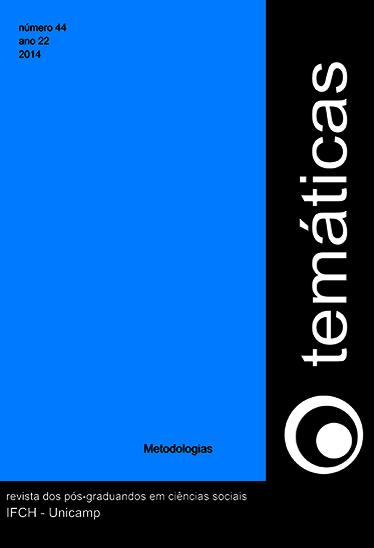Resumo
Buscaremos, neste ensaio, apresentar propostas teóricas possíveis para pensar uma situação inusitada e particular em que se encontram muitos indianos atualmente. Partiremos de experiências concretas, frutos de um estranhamento que beira a perplexidade, para mostrar a dificuldade real em compreender o que se entende por modernidade na Índia. Seguimos com uma revisão bibliográfica de autores os quais acreditamos que estão na busca por compreender uma realidade que necessita de pressupostos teóricos cujo escopo seja capaz de abarcar uma cultura milenar forte e persistente em contato direto com a globalização. Para isso, traremos a discussão textos de Homi Bhabha e parte da obra de Salman Rushdie.
Referências
ASAD, T. Ethnography, Literature, and Politics: some readings and uses of Salman.Rushdie’s The Satanic Verses. In: Cultural Anthropology. v. 5, n. 3, p. 239-269, 1990.
BANKS, J Monopoly Television: MTV’s quest to control the music. Westview Press 1996.
BHABHA, H. O local da cultura. Belo Horizonte: Editora UFMG, 1998.
BIJAPURKAR, R. A Market in Discontinuity. In: The Economic Times, 4-10 1998.
CHATTERJEE, P. Our Modernity. Published by the South-South Exchange Programme for Research on the History of Development (SEPHIS) and the Council for the Development of Social Science Research in Africa (CODESRIA). Rotterdam/Dakar, 1997.
JULURI, V. Music Television and the Invention of Youth Culture in India In: Television & New Media.v. 3, n. 4, p. 367-386, nov. 2002.
MITCHELL, W. J. T. Translator translated. Interview with cultural theorist Homi Bhabha. In: Artforum International Magazine. v. 33 n. 7, p. 80-84, p. 80-84, 1995.
MURTHY, A. U. R. The Search for Identity: A Kannada Writer’s Viewpoint. In: AMIRTHANAYAGAN G Asian and Western Writers in Dialogue: new cultural identity. London: ed. Guy, 1982.
NIYOGI, S. Bengali-American Fiction in Immigrant Identity Work. In: Cultural Sociology. v. 5, n. 02, p. 243-262, 2011.
O’CONNOR, E. Preface for a Post-Postcolonial Criticism. In: Victorian Studies. v. 5, n. 2. Indiana university Press, p. 217-246, 2003.
RAJAN, R. S. The third world academic in other places; or, the Postcolonial Intellectual revisited. In: Critical Inquiry. v. 23, n. 3, Front Lines/Border Posts. University of Chicago Press, p. 596-616, 1997.
RUSHDIE, S. Os filhos da meia noite. Lisboa: Dom Quixote, 1981.
RUSHDIE, S. Os versos satânicos.São Paulo: Cia. das Letras,1988.
RUSHDIE, S. Vergonha. São Paulo:Cia. das Letras, 1983.
SAID, E Culture and Imperialism. London: Vintage Books, 1993.
SEN, A Identity and Violence: The Illusion of Destiny. W.W. Norton, 2006.
SPIVAK, G. C. Three Women’s Text and a Critique of Imperialism. In: Critical Inquiry, v. 12, n. 1. CosacNaiFy, p. 243-261, 1985.

Este trabalho está licenciado sob uma licença Creative Commons Attribution-NonCommercial-ShareAlike 4.0 International License.
Copyright (c) 2014 Mariana Faiad Batista Alves

